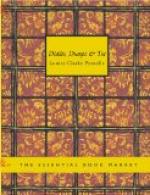“And from that time I was no more a slave, but a child in the house. My mistress brought a governess for me from the North, and I was taught as white girls are. I was fond of my books, and my life was a very happy one, though we lived on a lonely plantation, and had but little company.
“I was almost white, as you see, and my mistress had taught me to call her mamma. I was devoted to her, and very fond of my governess, and they both petted me as if I really had been a daughter instead of a slave. Four years ago the brother of my governess came out from Vermont to make his sister a visit at our home. He fell in love with me, and I loved him dearly, and, accompanied by my ‘mamma’ and his sister, we went into Pennsylvania, and were married. You know we could not be married in Maryland, for it is a Slave State, and I was a slave. My mistress had, of course, always intended that I should be free, but neglected from time to time to draw up the proper papers.
“For two years after my marriage my husband and I lived on the plantation, he managing the estate until he was called to Washington on business, and, in returning, the train was thrown down an embankment, and he was among the killed.
“Soon after that my baby was born, and before he was six months old my mistress died suddenly, when it was found that the estate was insolvent, and everything must be sold to pay the debts; and I and my baby, with the other goods and chattels, were put up for sale. Mr. Martin, the speculator, bought me, thinking I would bring a fancy price; but my heart was broken, and I grieved until my health gave way, so that nobody ever wanted me, until your kind-hearted master bought me to give me a home to die in. But oh, Uncle Bob,” she continued, bursting into tears, “to think my boy, my baby, must be a slave! His father’s relatives are poor. He had only a widowed mother and two sisters. They are not able to buy my child, and he must be raised in ignorance, to do another’s bidding all his life, my poor little baby! His dear father hated slavery, and it seems so hard that his son must be a slave!”
“Now don’t yer take on like dat, er makin’ uv yerse’f sick,” said Uncle Bob; “I know wat I gwine do; my min’ hit’s made up; hit’s true, I’m brack, but den my min’ hit’s made up. Now you go on back ter de house, outn dis damp a’r, an’ tuck cyar er yerse’f, an’ don’t yer be er frettin’, nuther, caze my marster, he’s de bes’ man dey is; an’ den, ‘sides dat, my min’ hit’s made up. Hyear, honey,” addressing the child, “take deze hyear wite-oak splits an’ go’n make yer er baskit ‘long o’ yer ma.”
[Illustration: “MY MIN’ HIT’S MADE UP.”]
Ann and her baby returned to the house, but Uncle Snake-bit Bob, long after the sun went down, still sat on his little bench in front of his shop, his elbows on his knees, and his face buried in his hands; and when it grew quite dark he rose, and put away his splits and his baskets, saying to himself,




